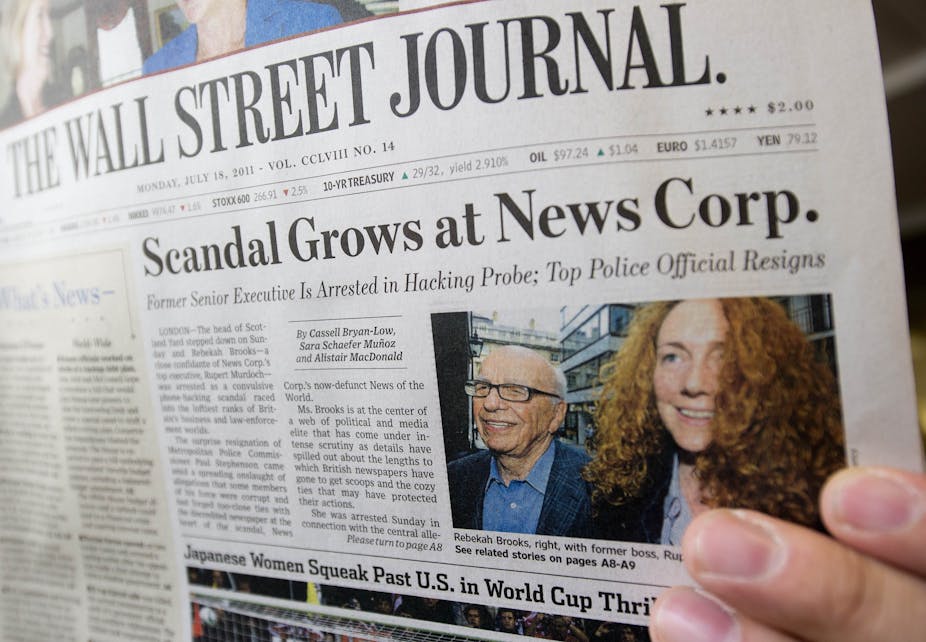The handwritten sign hanging on the bereaved family’s door says: “No media”. As a reporter, do you knock? Most journalism students yell back a resounding “No”.
Okay then, what if the family has a high public profile? Say the father is a government minister or talk show host? Does that change anything? Should different standards of privacy apply? How about asking the neighbours if they have a photo of the deceased? An anecdote about the family? What if the neighbours say they suspect the family murdered the child? The local copper says, off the record, that the “No media” sign is rubbish and that the family has sold its story to a current affairs program. Do you knock?
Tricky thing, journalism ethics. The sensitive reporter turns to walk away from the front door. Just then a television crew pulls up and a young man with a confident swagger marches to the door and punches the bell. Should the sensitive reporter hang around to see what happens or maintain the same stance and potentially be scooped and later shredded by an editor?
This is an example from Journalism101 but serves to illustrate the ethical complexities that confront journalists almost daily wherever they work. General principles and codes that encourage independent, honest and transparent behaviour are useful but the variability of on-the-ground reporting makes it almost impossible to regulate media behavior in any way that is meaningful. In any event, rules and laws are no substitute for a moral compass.
Two issues are widely misunderstood about the ideal of journalism in democracies. Firstly, quality journalism, is not a cooperative venture. Politicians, police and others wanting to tame the media miss this point whenever they complain of a media conspiracy and demand more regulation. The extent to which the above is true waxes and wanes with critics complaining that either journalists or publications are too compliant or too aggressive. Nevertheless, in a healthy democracy, the ideal must be that the media, as the Fourth Estate, stands apart.
Secondly, many people seem to think that reporters write stories to increase newspaper sales and need to sex up their copy by using nefarious methods such as voicemail hacking. Whatever the case in Britain where the market is far more competitive, as a former editor and reporter for 33 years I’ve yet to meet an Australian reporter whose main motivation was to sell newspapers. It is the story and the hunt for verifiable information that ignites journalists.
Prime Minister Julia Gillard believes the volume of crap being written has increased. That may be true. Bob Brown feels beaten up by Murdoch newspapers. That also may be true. Murdoch newspapers push – or rather roast the envelope on some issues, often substituting reporting for advocacy – but there is no evidence of illegal or ethically questionable news gathering.
If both those complaints are true … well, so what? No-one today is forced to swallow crap. The increasing accessibility of official reports, judicial decisions, government data and international news sources on the internet not only has diminished the influence of Big Media and the value of “scoops’ and "exclusives”, it has given the public power to scrutinise and critique individual journalists.
Anyone can blog their own version of the news if they wish. Anyone can tweet about bias in reporting; anyone can unsubscribe. These are self-correcting mechanisms that work to make reporters and editors wary of potential ethical pitfalls and more carefully weigh up privacy-public interest issues.
In the mid-1970s as a police reporter on the morning shift I knocked on doors. I walked away when families told me to leave and drank lots of cups of tea with those wanting to talk. Once, after being asked to leave and doing so, a chief of staff ordered me over the car phone to buy flowers or chocolates – I forget which – and return to the house. I managed to talk him out of the idea … just.
Thankfully, newsrooms are more sophisticated these days and I doubt similar requests would be made. Journalists and editors are better educated, more engaged with community standards, have a deeper understanding of ethical issues and are under greater public scrutiny. And it’s that improved culture together with a new generation of journalists rather than any regulation or legislation that will lead to better and more ethical journalism.

